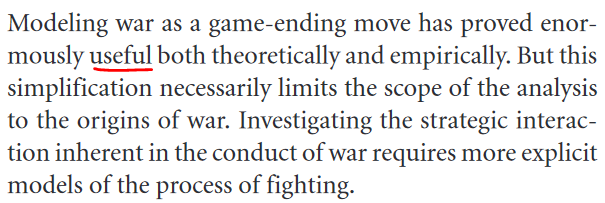Is game theory "useful" for understanding international politics?
According to Robert Powell, the answer is "yes, but know its limits."
[THREAD]
According to Robert Powell, the answer is "yes, but know its limits."
[THREAD]

Powell's work largely focused on using mathematical formal models (i.e. game theory) to study international conflict.
And, as @jkertzer recently shared, Powell was VERY good at math!
And, as @jkertzer recently shared, Powell was VERY good at math!
https://twitter.com/jkertzer/status/1470779893055205390
What always stood out to me was his willingness to discuss the limits of using models to understand international politics.
He would do so with short quips buried in his most-influential papers. These quips offered "meta" insights into the role of theory.
Here are 4 examples.
He would do so with short quips buried in his most-influential papers. These quips offered "meta" insights into the role of theory.
Here are 4 examples.
First is his 1991 @apsrjournal paper on "relative gains v absolute gains".
cambridge.org/core/journals/…
cambridge.org/core/journals/…
This paper is his contribution to the great "isms" debate that dominated much of the 1980s in American IR
cup.columbia.edu/book/neorealis…
cup.columbia.edu/book/neorealis…
He views the debate as boiling down to whether states (a) care about their own gains (i.e. absolute gains), or (b) they care about how their gains compare to the gains of others (i.e relative gains).
His answer, which he supports with a model, is "it depends" (primarily on the destructiveness of fighting) 

His key "meta" insight comes in the conclusion: the "theoretical" and the "empirical" should not be confused...scholars tend to forget this.
Something could be theoretically useful for gaining insights - say, the unitary actor assumption - even if it is not empirically supported
Something could be theoretically useful for gaining insights - say, the unitary actor assumption - even if it is not empirically supported

Second is his 2004 @AJPS_Editor paper on how war fighting is a CONTINUATION of bargaining, NOT what happens when bargaining ENDS.
onlinelibrary.wiley.com/doi/abs/10.111…
onlinelibrary.wiley.com/doi/abs/10.111…
He acknowledges that treating "war" as the end of bargaining has been useful. Hence, it's not "wrong".
But he then notes that this limits what formal models can say. Hence, to understand more about war, we have to model the wars themselves.
But he then notes that this limits what formal models can say. Hence, to understand more about war, we have to model the wars themselves.

Powell thinks progress can be made by treating war as a continuation of that bargaining, not as a different process from pre-war bargaining. 

But he finds bargaining models to be VERY sensitive to assumptions about (1) the information available to states & (2) the bargaining processes they use (the figure below is a stylized view of such a process). 

This leads to his key "meta" insight: when theoretical insights are highly contingent on assumptions, make assumptions that match empirical reality. 

Third is his 2006 @IntOrgJournal paper, which is Powell's most cited paper.
cambridge.org/core/journals/…
cambridge.org/core/journals/…
Powell's paper is a direct response to the 1995 @IntOrgJournal paper by James Fearon, "Rationalist Explanations for War" (which I discussed in a #KeepRealismReal thread)
https://twitter.com/ProfPaulPoast/status/1421445829710204935
Powell agrees that war is puzzling because it seems REALLY inefficient: it's costly and results in outcomes that could have been reached without the cost.
His goal in the paper is to focus on inefficiency. This means assuming their on no informational problems.
His goal in the paper is to focus on inefficiency. This means assuming their on no informational problems.

He warns that one can't just treat "commitment problem" as "anarchy". That won't shed any insights because, well, anarchy is a constant 

Instead, he thinks commitment problems arise and undermine the prospects for peace when there are concerns over future power shifts 

But he also warns against focusing too much "informational" explanations for war. This leads to his next "meta" insight: theory should not generate "bizarre" readings of history. 

His example is prolonged conflict: if it's just about information, then long wars must be due to the sides never learning more about each other. But that simply can't been true. 

Fourth (and my favorite) is from his 1999 @PrincetonUPress book "In the Shadow of Power".
amazon.com/Shadow-Power-R…
amazon.com/Shadow-Power-R…
Why my favorite? Because it's a line I've used many times (in papers, in lectures, and here on Twitter).
When talking about the use of the bargaining model to understand war, he writes:
"The models are very spare, and, indeed, almost certainly too spare to explain any particular outcome in any degree of specificity."
"The models are very spare, and, indeed, almost certainly too spare to explain any particular outcome in any degree of specificity."
In other words, the models are great for helping one thinking about conditions that make war LIKELY.
In this way, formal models do the same thing as statistical models: they help identify CONDITIONS.
oxfordre.com/politics/view/…
In this way, formal models do the same thing as statistical models: they help identify CONDITIONS.
oxfordre.com/politics/view/…
But causes for particular cases? That's trickier and is really beyond the purpose of ANY model (it is, after all, a MODEL).
In sum, Powell taught us:
- theory assumptions NEED NOT be empirically grounded
- theory assumptions SHOULD be empirically grounded if theory's INSIGHTS are highly sensitive to assumptions
- theory shouldn't lead to bizarre history
- theory is about conditions
- theory assumptions NEED NOT be empirically grounded
- theory assumptions SHOULD be empirically grounded if theory's INSIGHTS are highly sensitive to assumptions
- theory shouldn't lead to bizarre history
- theory is about conditions
Thinking clearly about theory is just one reason the discipline of International Relations is better off thanks to Robert Powell.
And is also why he'll be missed.
[END]
And is also why he'll be missed.
[END]
• • •
Missing some Tweet in this thread? You can try to
force a refresh












